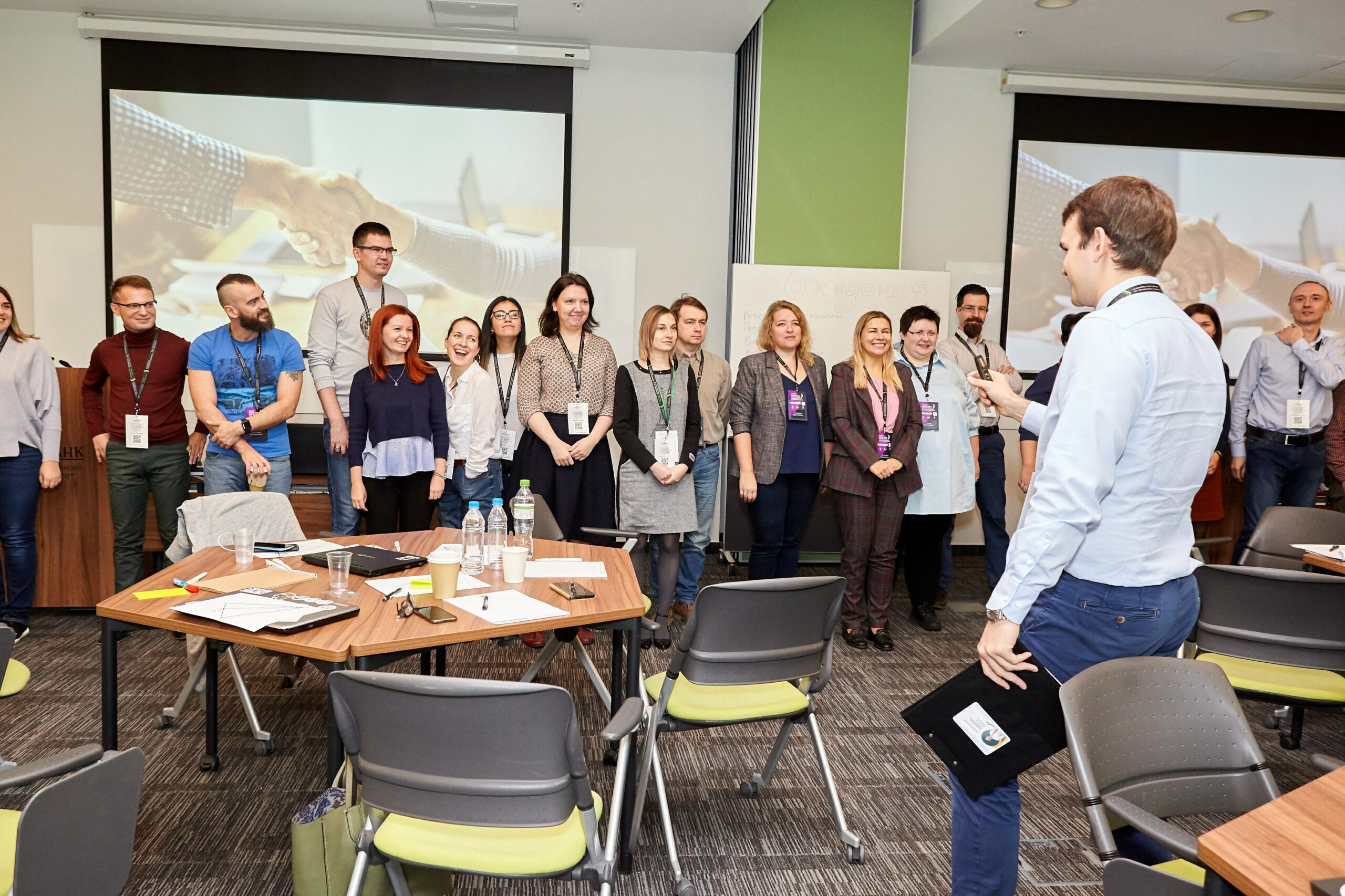May 12, 2022 / Esther Choy

A storytelling culture at work can help companies achieve new results, argues Artem Mushin-Makedonskiy, founder of Historia Academy.
As you read this interview with my friend and colleague Artem Mushin-Makedonskiy, you will notice that he references how he entered into the storytelling world by reaching out to professional storytellers and interviewing them on YouTube. I was one of the people he reached out to, and to be quite honest, I read his first email with skepticism. I didn’t know him or what he wanted, so I deleted his first (and second and third) email.
Unbeknownst to Artem, prior to his outreach to me, a copy of my book Let The Story Do The Work had been posted illegally on the internet in its entirety by some unknown person. This breach of trust made me feel suspicious toward strangers, even, or especially, strangers continents away.
I regret to say that he had to email me several more times before I took him seriously. But I’m glad I did overcome my hesitation, because when I spoke to him during our first interview, I met an authentic learner, teacher and lover of story and storytelling culture.
It is Artem’s belief in the power of story that energizes his free annual conference. This year’s conference Storify Your Culture will be held May 18-20 and brings together storytelling professionals around the globe. I hope you will enjoy his insights in the interview below.
When did you know you wanted to start Historia Academy? Was there a certain story that caught your imagination and helped you understand the power of story?
I wasn’t thinking about opening my own business to be honest. My wife Anne was beginning her practice as a narrative psychotherapist and that inspired me to understand the deeper meaning behind a story.
At that time, back in 2019, I was working as an L&D manager at a local division of Société Générale. As “extra curriculum” I started reading books on business storytelling, first in Russian, then in English. Fifty books in I felt it was not enough and I started reaching out to professional storytellers and asking them for an interview. To my surprise and awe 95% of them agreed to chat with me! I posted the recordings online for free and that’s how my YouTube channel was born.
I wasn’t thinking about a career as a storyteller. However, it seems life had other plans. Out of nowhere me and more than 500 employees of the division I was working for were fired.
I was 25, my son was 10 months old and we didn’t have much savings. Luckily, a friend of mine invited me to join him as a facilitator on a government strategic session. He needed somebody who could help the participants present their projects in under 5 minutes to an audience of 100+ people from all across Russia. I agreed and flew to Kazan, and this trip changed my life.
I was working with a team of 15 people and their first presentations looked like a bunch of numbers and data. I had a facilitators’ guide but I felt an urge to try something other than that. So during a break I asked one of the participants, Sergey, to share with me how he get the idea for his project. Sergey hesitated, but after several minutes he told me a compelling story about entrepreneurial friends who ran into problems with their businesses because they didn’t understand governmental regulations and ran afoul of them: “I thought that my friends aren’t idiots – they just didn’t know what is wrong and right when you are doing business in Russia.” Thus, he was inspired to start a collaborative knowledge base for entrepreneurs with the help of government officials.
 He had never shared this story with any of his stakeholders. That day, he told his authentic story and received a big round of applause from an audience of 100 people. Several people came up to him and asked for his contact information and details of the project.
He had never shared this story with any of his stakeholders. That day, he told his authentic story and received a big round of applause from an audience of 100 people. Several people came up to him and asked for his contact information and details of the project.
I founded Academy Historia focusing on storytelling for business. But since storytelling was perceived as “a thingy for public speaking” I had to show the potential of stories in business. So in my first year I organized and hosted an online conference about storytelling in business! Where did I get the speakers? Well, I simply invited the people I interviewed and a lot of them agreed because they knew I was about educating people, not up-selling!
This year we are hosting the third conference with the theme “Storify Your Culture.” So you could say Academy Historia was born out of passion for human connection and the discovered potential of story.
Recent events like COVID-19 and the conflict in Ukraine have revealed how quickly the status quo can change. Is storytelling a relevant tool during times of uncertainty? How so?
Storytelling is not just relevant, it is truly essential in the changing times. Let’s look at it from a leadership perspective. The traditional way of communicating with employees was: Tell them what they should do (what), how it should be done (how), and what they will get out of it (why).
That scheme was working quite right. The potential one employee brings to the workplace has drastically changed. And now employees need to make decisions on the “what” and “how” of their job. And these decisions should be in line with the rest of the company.
That said, it is impossible to keep up with the pace of changes unless everyone understands clearly the “why” of a business. And I don’t just mean personal motivation but also understanding meaning, purpose and idea behind the task at hand.
Since a story is a primary way to transmit the “Why” it is becoming just as important as explaining the “What & How” of the Industrial age. While this idea is simple but not yet fully understood and implemented. People who understand “Why” they do the things have greater potential than those, who are limited to knowing only “What and How” about the job they have.
Understanding the “Why” behind any job gives an unparalleled agility to the employee and to their company, while remaining fully aligned with the core “Why” of the company.
 Your conference is for business leaders around the world. Your presenters are from around the globe. You will also have simultaneous translation so it’s accessible to audiences beyond English-speakers. Why is this important to you? What is it about storytelling that has appeal for business around the globe?
Your conference is for business leaders around the world. Your presenters are from around the globe. You will also have simultaneous translation so it’s accessible to audiences beyond English-speakers. Why is this important to you? What is it about storytelling that has appeal for business around the globe?
The minute I saw Sergey get a standing ovation after his story I instantly thought that I wanted to share the feeling Sergey had with as many people as possible. The more I’ve learnt about storytelling and its application, I realize that it’s a potential that hasn’t been yet fully discovered by people in business.
Last year, I had a moment after the conference when one of the participants called me and asked if I could help her work with the culture in her growing company. She didn’t ask if it was possible to do that with storytelling, she just went straight to me because she knew it was possible. I really felt inspired because at that moment I realized that she has discovered the potential of story at work – that’s much more important than profit.
What is a storytelling culture in a workplace? Why should this be a goal for a company? Who benefits from creating a storytelling culture?
The theme of this year’s conference is “Storify Your Culture” and the core question we are about to explore is: “What if we embrace story as a tool to work with our corporate culture?” It’s not so much about creating storytelling culture, it’s about using stories to work with culture. That’s the essence of my approach to storytelling – story is a tool and a service for something, not the end goal.
However, working with stories should become a separate goal for companies that want to achieve new results. The reason is that more and more often people ask bold “Why” questions. For example, an employee at the hotel might be thinking: “Why should I act a certain way towards my clients while I’m working here?” A story about a time when an employee went out of his way to help a guest even though it took him extra effort and ended up receiving praise will convey a clear answer to this question and will ultimately strengthen values and behaviors that create a culture of service. Simply saying “Well, because…” doesn’t work that way; it just doesn’t land with the listeners.
Another example, a potential client might be asking himself: “Why should I believe that his company cares about its customers?” Here’s how Northwestern Mutual replies with a short story from their website: “The year was 1859. An ox and a passenger train collided just outside Johnson Creek, Wisconsin, and two of our policyowners were killed in the wreck. The claims totaled $3,500, which was $1,500 more than our two-year-old company had on hand. Then President Samuel S. Daggett and his fellow trustees personally borrowed the money to settle the claims, proving that our dedication to our clients is as old as the company itself.”
After reading this story, potential customers immediately understand what to expect from this company and its employees: loyalty and real customer service. This story doesn’t push us towards this idea, it doesn’t reason or argue. Instead, it invites us into a space and time in the past so we can draw our conclusions about this company’s future behavior.
Your website says a storytelling culture can help bring humanity back to business. Can you share more about that idea? Do you have examples?
I truly believe that it is inhuman to work in a company where you only know what, how, and the personal motivation. I don’t mean that these things are irrelevant, I mean that those are not the things that create the feeling of being human.
Remember the last time when you were striving to achieve a goal so much that you could go without sleep, food or even a specific reward in the end. Such enormous energy doesn’t come from extrinsic motivation, it comes from within.
Imagine that every time a leader sets a goal, she tells a story — not a fable or a myth —but a real-life chain of events that led him to the realization that achieving this goal is important. Would that change how you feel about achieving this goal?
Every time a leader uses a story, he creates more meaning around him and that creates a human environment at work. I believe that everyone can benefit from understanding how the story works.
—
Now that you’ve gotten to know Artem, you can sign up for his free conference to meet and learn from storytelling professionals from around the globe.
Better Every Story
Leadership Transformation through Storytelling
"This is an amazing and insightful post! I hadn’t thought of that so you broadened my perspective. I always appreciate your insight!" - Dan B.
Get Esther Choy’s insights, best practices and examples of great storytelling to your inbox each month.




